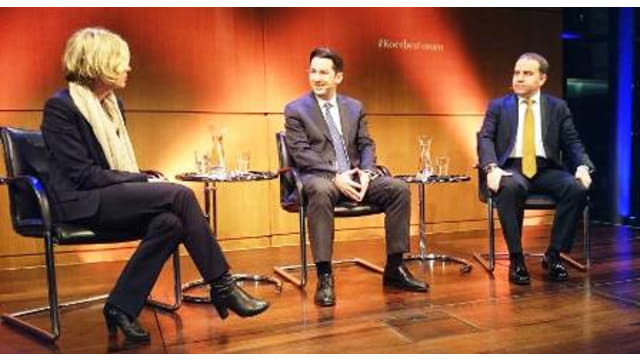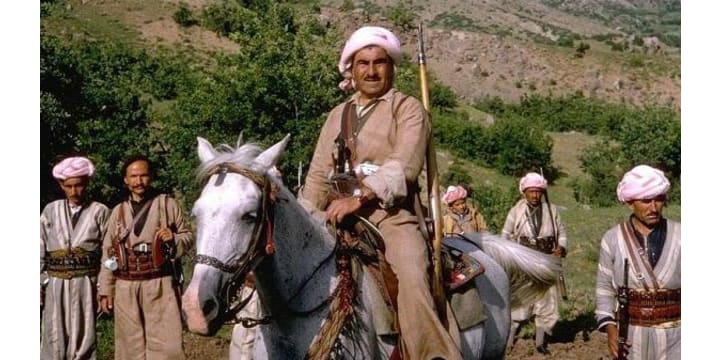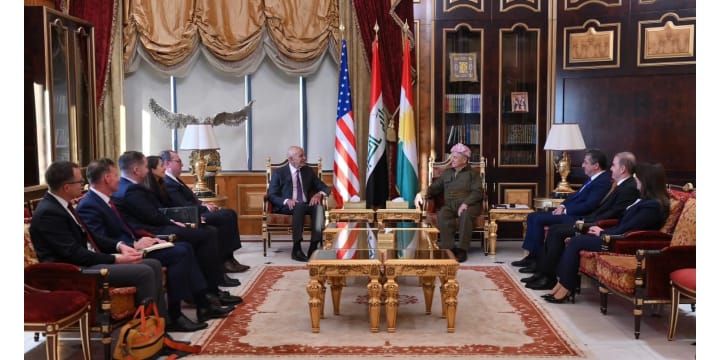
Hawrami: We as Kurds are a different nation compared to Iraq but politically attached since 1920s but haven't been asked whether we want to be a part of their country
By official invitation, Hemin Hawrami head of Kurdistan Democratic Party's Foreign Relations Office partaking at Korber Foundation forum in Hamburg to discuss Kurdistan's path to independence.
Forum Moderator: Hemin, I wanted to start with you. You were born in the town of Halabja which is known to many people due to the very tragic, very horrific chemical attacks that were perpetrated by the Saddam regime in the late 80's and I wondered when I prepared for our conversation when was the first time you actually realised that being a Kurd is different from being an Iraqi, a non-Kurdish Iraqi or a Syrian or a Turk. Do you remember that point?
Hemin: Thank you very much I'm very honoured to be here among colleagues and friends. Thank you very much for the invitation. To be very honest with you, I never felt that I am Iraqi because what I have seen from the Iraqi state, Iraq is an artificial state, if you go back earlier to the 1920's there was nothing to be called Iraq. We had three pillars that was part of the Ottoman Empire. So, I always heard stories from my father, for example my mother lost 3 brothers in the war with the Iraqi state. My father was a Peshmerga since 1963, so always in my family within relatives we have seen atrocities from Iraq, from Baghdad. We have not felt we are citizens of that country. What we have heard seen and heard from the Iraqis are distractions, destroying 4,500 villages of Iraqi Kurdistan region. Mass graves, chemical bombardments, Anfal campaigns. After this moment out of one hundred and eighty two thousand Kurds, we only managed to find 5000 corpses of theirs, all buried alive. So, that is why to be very honest with you, we as the Kurds, we are a different nation and when we have been attached to Iraq it was established in 1920 and we have not been asked whether you want to be part of this country [Iraq] or not, that's why we have a different language, a different culture, we have different geography and we have a different identity, so we want to run our own country through ourselves, so that is why to be honest with you again, we never felt that we are Iraqi because whatever we what seen from Iraqis, not even in the past but even in the contemporary history that we are living in. Saddam Hussein ruled Iraq and Kurdistan, he committed these atrocities but never cut the budget of the people of Kurdistan, even now the current Iraqi government cut the budget of the Iraqi Kurdistan region so imagine that even with the new Iraq that we hope to be a federal, pluralistic, democratic, secular Iraq even in that Iraq they do not accept Kurdistan to be also partners when they are not accepting us to be partners we do not accept to be their subordinates as well. So, that is why we do not want to be part of that chaotic situation in Iraq and we have our own cases to process for the self determination of the Iraqi Kurdistan process.
The view from Erbil we always look at the relation with Turkey based on two variables. Firstly, the Turkish relationship with the Iraqi Kurdistan region and also the Turkish policy for the issue inside Turkey, so all the other relationships that we have based on these two variables. We have to say that since the creation of democracy in modern Turkey, the Kurdish situation, the Kurdish case, the Kurdish problem have been dealt with through assimilation, denial and the lack of understanding. I remember in 1956, the Egyptians started servicing the Kurdish language and then the Turkish ambassador received a letter from the government to pass on to Jamal Abdul Nasser, accusing Abdul Nasser of meddling in the National Security of Turkey and then Jamal Abdul Nasser told the Turkish ambassador that previously he heard him say, "Do you have the Kurds in Turkey" he replied, "No, no, no we do not have any Kurds in Turkey". He said 'Ok why are we meddling in your national security if you do not have Kurds in Turkey'. So, we have to admit that the Kurdish moment has arrived in the Middle East. The old Middle East has gone. Kurdistan has been divided into four parts, so every part of Kurdistan has its own context. So from Erbil perspective, we do believe that there is a change from Turkey, we are welcoming that change and we have supported that process. We never believed that through violence Kurds can achieve anything in Turkey and Turkish state through military operations or denial or assimilation that they can find any solution for the Kurdish question inside Turkey. In terms of the relationship with Iraqi Kurdistan region from 1991 to 2003 and even a bit more after that, Turkish vision toward Iraqi Kurdistan region, Turkish perception based on security issues. They were looking at Kurdistan as a source of instability, looking at the Kurdistan region as a galvaniser for divisions within Turkey for galvanised nationalism within Turkey so that's why Turkish foreign policy toward Iraqi Kurdistan region were looking at Kurdistan as a source of threat for their national security but now Iraqi Kurdistan region proved it is not a threat to the regional stability, it is not a threat to the regional security. Kurdistan can be for Turkey also as an asset on the regional balance not a security threat for Turkish regional stability and Iraqi Kurdistan region proved that even economically if you look at the level of Turkish trade with Iraq out of 12 billion dollars’ worth of trade with Iraq, 9 billion of it was with Iraqi Kurdistan region, Turkish businesses in Iraqi Kurdistan out of 3000 foreign companies that we have in Iraqi Kurdistan region. 1,300 of them were from Turkey so that's why our relationship with Turkey.
We remember very, very well President Barzani and President Talabani as tribal leaders but we have seen that and they have admitted and recognised Iraqi Kurdistan region, they opened a consulate in Erbil, they started a better economic relationship. In this war on Isis [Islamic State], we are expecting more from Turkey because Turkey and Kurdistan region, we need each other. Turkey is our strategic gate for the international community for all timelines but Turkey cannot ignore the importance of Kurdistan for its regional balance for its sudden security. Kurdistan region right now is acting like a buffer zone for the security of south of Turkey in terms of the Sunni-Shi'ee rivalry that we have in Iraq. So, that is why from Iraqi Kurdistan region, we have part of the solution even for the peace processes in Turkey. We do believe that there is not an alternative for the peace process. The belief and energy of the peace process must be there because we do not have any other alternative. The alternative is the continuation of the bloodshed that we proved has failed.
Forum Moderator: We are very concerned because we do believe that again this is going to cost more instability in the region and Turkey will be stronger if they can find a peaceful democratic solution for the Kurdish question in Turkey and we have also sent messages and talked to the Kurdish politicians and also sent messages to PKK that they should seize that moment, any political opportunity any political participation in parliament in government.
Hemin: We are hopeful for IZDP after they won 80 seats in parliament to join the Government in order to boost the peace process within the Government and to impose their conditions on the AK Party. We are concerned about the restart of the war inside Turkey because we have seen it. Since 1984 up until this moment, Turkey did 28 military incursions against PKK what is the result still PKK are there. PKK launched military and violent oppositions against the Turkish state what happened Turkey is still there. Military and Operational is not going to lead to anything but democracy; political participation is going to led to more fruits.
The Korber Foundation is taking on current social challenges with its operational projects, in its networks and with cooperation partners. At present, the focus of its work is on the five topics Dialogue with Asia, Shaping Democracy, MINT Promotion, Potential of Old Age and Music Education.
Fathered in 1959 by the entrepreneur and instigator Kurt A. Körber, the foundation is now active both nationally and internationally with its own projects and events from its locations in Hamburg and Berlin.
Transcribed by the KDP FRO Communications Department.
https://youtu.be/xW7jjlrXzQ0

